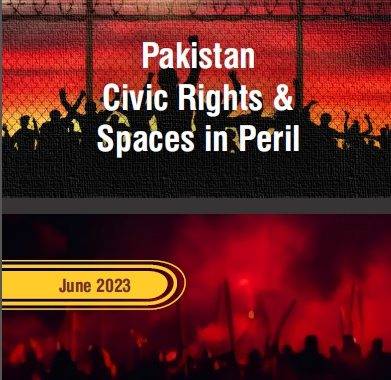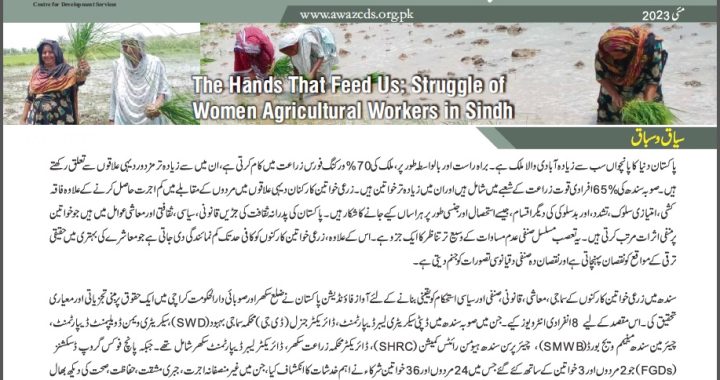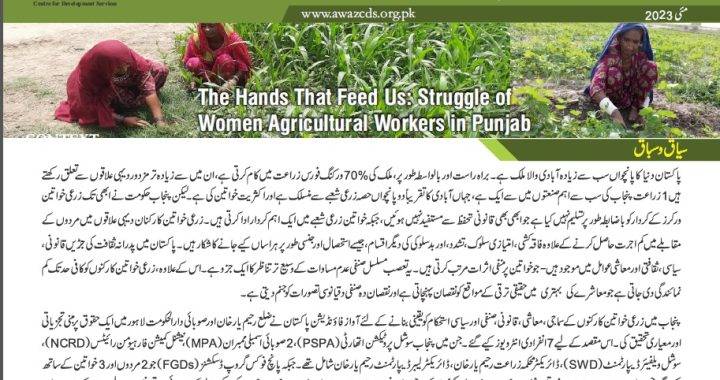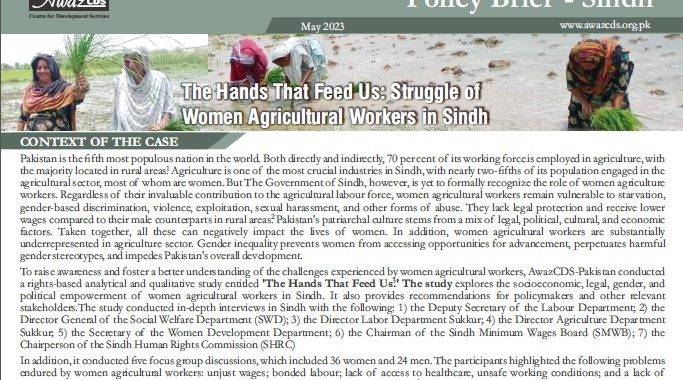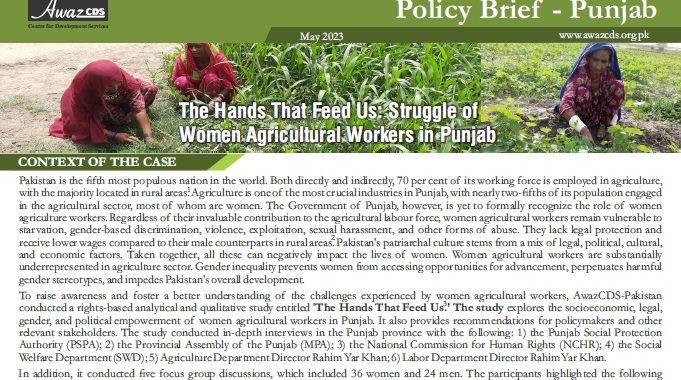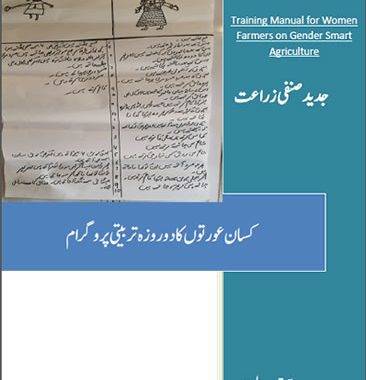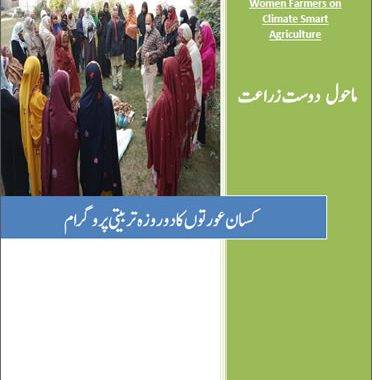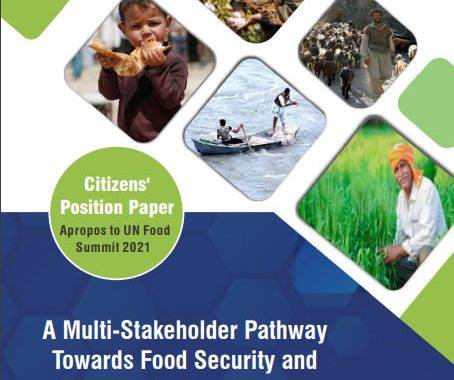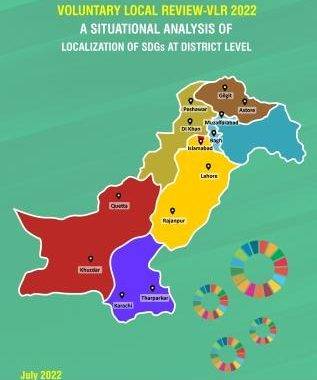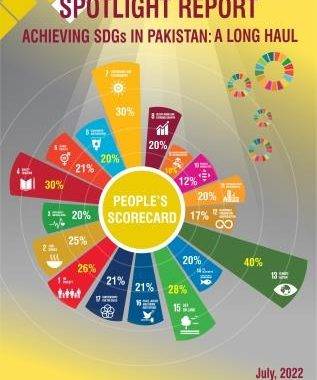The report is all about emergence, growth and transformation of non-governmental and/ or civil society sector in Pakistan. The report shares the challenges being faced by the sector since long and sheds light on coping mechanisms adopted by the sector to survive as well as struggles to create enabling environment for civic rights and spaces in Pakistan. The report provides empirical analysis of the fights of civil society sector with state institutions, governments and society at large to reclaim civic rights and
spaces in different spans of time.
Category Archives: Publications
Policy Brief on WAWs Rights-Sindh (English)
Pakistan is the fifth most populous nation in the world. Both directly and indirectly, 70 per cent of its working force is employed in agriculture, with the majority located in rural areas. Agriculture is one of the most crucial industries in Sindh, with nearly two-fifths of its population engaged in the agricultural sector, most of whom are women. But The Government of Sindh, however, is yet to formally recognize the role of women agriculture workers. Regardless of their invaluable contribution to the agricultural labour force, women agricultural workers remain vulnerable to starvation, gender-based discrimination, violence, exploitation, sexual harassment, and other forms of abuse. They lack legal protection and receive lower wages compared to their male counterparts in rural areas. Pakistan’s patriarchal culture stems from a mix of legal, political, cultural, and economic factors. Taken together, all these can negatively impact the lives of women. In addition, women agricultural workers are substantially underrepresented in agriculture sector. Gender inequality prevents women from accessing opportunities for advancement, perpetuates harmful gender stereotypes, and impedes Pakistan’s overall development.
Policy Brief on WAWs Rights-Punjab (English)
Pakistan is the fifth most populous nation in the world. Both directly and indirectly, 70 per cent of its working force is employed in agriculture, with the majority located in rural areas. Agriculture is one of the most crucial industries in Sindh, with nearly two-fifths of its population engaged in the agricultural sector, most of whom are women. But The Government of Sindh, however, is yet to formally recognize the role of women agriculture workers. Regardless of their invaluable contribution to the agricultural labour force, women agricultural workers remain vulnerable to starvation, gender-based discrimination, violence, exploitation, sexual harassment, and other forms of abuse. They lack legal protection and receive lower wages compared to their male counterparts in rural areas. Pakistan’s patriarchal culture stems from a mix of legal, political, cultural, and economic factors. Taken together, all these can negatively impact the lives of women. In addition, women agricultural workers are substantially underrepresented in agriculture sector. Gender inequality prevents women from accessing opportunities for advancement, perpetuates harmful gender stereotypes, and impedes Pakistan’s overall development.
Citizens’ Position Paper
Pakistan is one of the largest food producing countries in the world yet we have severe challenges around availability of even staple food items , accessibility & necessary quantity of food for all and above than all quality food produce and its by-products. Nutritional aspects, utilisation behaviours and sustainable provision of adequate food for all are also un addressed yet. More than 64% population lives in rural areas of Pakistan and around 90% of them are directly engaged with agriculture sector, 43% work in agricultural fields as informal labourer to make their livings. Agriculture, livestock and fisheries are largely known as food assurance sectors in every country and so as in Pakistan however these sectors are highly un-regulated and under-developed due to lack of research and poor extension services for farmers, livestock entrepreneurs and fisherfolks.
Voluntary Local Review-2022
The Voluntary Local Review (VLR) is an analysis of the Sustainable Development Goals (SDGs) for a specific local context. It is a very important monitoring tool for their implementation at city or regional level. The process of SDGs localization that starts with the Voluntary Local Review allows local authorities to identify their own priorities and territorial specificities. When it combines a careful analysis of indicators with a participatory process that involves citizen and local stakeholders and a coherence analysis of existing policies as a basis for planning and policy design it also becomes a strategic planning tool. “Localization” is the process of taking into account national, subnational and local contexts in the achievement of SDGs, from the setting of goals and targets, to determining the means of implementation and using indicators to measure and monitor progress.”
CSOs-Spotlight-Report-2022
Spotlight Report is an alternative and civil society led report on Sustainable Development Goals, the idea was part of regular interventions of Pakistan Development Alliance around national, regional and global advocacy opportunities including High Level Political Forum (HLPF). Several countries including Pakistan followed their lead and developed parallel reports to official Voluntary National Review (VNR) through a participative process by collaborating with Civil Society Organizations (CSOs) and Non- Governmental Organizations (NGOs).
The People Score Card (PSC) is a tool for independent assessment of Governments’ progress and performance towards achievement of their socio- economic and political commitments through inclusion of people’s voices. The PSC gathers information from the people and depicting real, on ground situation with regard to performance and progress of Pakistan on SDGs. PSC results are inculcated in the CSOs led spotlight report presented at the United Nation’s High Level Political Forum (HLPF) in parallel to official VNRs by the Governments in July 2022.
